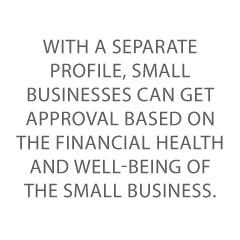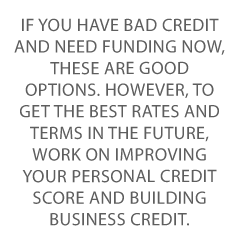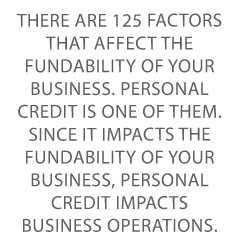
Recent Business Credit Questions: Can Business Credit Ease Inflation?
Your most recent business credit questions have been weighing on our minds. So, let’s talk about that — and inflation. There’s more of a connection than you may think. What better place to start than at the beginning?
Basic Business Credit Questions
Here are answers to some core business credit questions that the others build on.
What is Business Credit?
Business credit is credit in the name of the business. Every business owner should work to establish business credit and build a credit history.
There are a few reasons for this. First, it protects your consumer credit. Trying to make business purchases on personal credit can have a negative impact. The truth is, that’s the case even if you make your payments regularly and on time.
What Can Business Credit Do for Small Business Owners?
Creating a business credit profile means both your business and you can have a separate score. As a result, your ability to purchase a home or car will not be affected by your business expenses. Furthermore, your ability to get funding for your business will be less affected by your personal financial situation.
Your consumer credit report will have information on payments made, or missed, to your company’s creditors. The more positive history you have, the higher your score will be with whichever credit bureau the lender decides to use.
Why Should Business Owners Want to Have Business Credit Separate From Their Personal Credit?
With a separate profile, small businesses can get approval based on the financial health and well-being of the small business. Whether it is a business credit card, a line-of-credit, or a loan, approval will not be impacted as much by your personal finances. With business credit, it’s a truly separate credit score versus personal credit.
This not only makes it easier to get funding for your business, but it can open doors for you to get even more funding. For example, with a strong business credit profile, you are open to a higher limit and lower rates on a business credit card, lines-of-credit, and even vendor credit. Often, you can get these things despite bad consumer credit and without a personal guarantee.
Do Business Entities Matter When it Comes to Business Credit?
Absolutely—all business entities are not created equal. A sole proprietor can end up being personally liable for business debts. But in a business that is incorporated with its own tax ID, the owner’s personal assets are less likely to be on the line in case of default.
In addition, lenders want to see that a business is a separate entity from its owner. For that to happen, a business needs to have a Fundable Foundation. And that requires incorporating.
Foundation. And that requires incorporating.
What Does a Small Business Owner Need to Do?
To have a Fundable Foundation a business must be set up a certain way. For example, you need to incorporate. A sole proprietorship or even a partnership doesn’t work so well for Fundability
Foundation a business must be set up a certain way. For example, you need to incorporate. A sole proprietorship or even a partnership doesn’t work so well for Fundability .
.
You also need to have a name for the business that is consistent in all places, and that doesn’t warn of a high risk industry. So, “Bob’s” is better than “Bob’s Gas Station.” And, if it is “Bob & Joe’s,” do not list it as “Bob and Joe’s” somewhere else. Yes, even something as tiny as an ampersand can cause a problem.
Then, get an EIN and a D-U-N-S number. The EIN is like a Social Security Number for your business. You can get one for free on the IRS website. The D-U-N-S number is an identifying number you need to get in the Dun & Bradstreet system. You can get this number for free as well from their website.
A separate business bank account in the name of the small business is also necessary. Keeping business funds and personal funds separate is a good idea anyway. It makes tax time easier for sure. However, some credit providers make it a requirement for approval as well.
It’s also important to have a professional business website. The URL should have the name of the business if possible, and get a business email address that has the same URL as the website.
What Do Business Credit Bureaus Look for When Calculating Scores on a Business Credit Report?
A credit report will show a company’s pay history, even for items as seemingly inconsequential as office supplies. The exact way a score is calculated depends on the specific credit bureau. They each use a different formula.
Dun & Bradstreet is the largest and most commonly used business credit bureau. That’s why getting a D-U-N-S number is so important. You cannot be in their system without one.
That said, Equifax, Experian, and FICO SBSS are also used often. Generally speaking, the main factor that comes into consideration for the score on each of these reports is payment history. However, Experian and FICO SBSS use your personal score in the calculation of your business score. It’s not just about business credit card payments.
Inflation Related Business Credit Questions: What is Inflation?
According to Investopedia, “Inflation is a decrease in the purchasing power of money, reflected in a general increase in the prices of goods and services in an economy.”
In essence, your money does not go as far as it used to. This is true for all businesses, whether it’s a new business, a sole proprietorship, a partnership, a type of corporation, or an LLC.
How Does Inflation Affect Many Small Business Owners?
In business life, companies may find their business customers are looking to spend less. As a result, annual revenue can go down. It makes sense that customers may not want to be personally responsible for as much debt.
Business Credit Questions Connecting Inflation to Business Credit: How Do Inflation and Business Credit Relate to Each Other?
Many lenders and credit card companies will check your credit when deciding how much credit to extend or how large a small business loan they should approve you for. It can affect the interest rate you pay, too. Without business credit, a lender will only be checking consumer credit, as that’s all you’ve got to offer. And if that credit score isn’t so good, you won’t get much. You’ll get a lower credit limit (if they extend credit to you at all), and any potential lender may charge higher interest rates.
How Does What’s on Your Business Credit Report Affect Approvals?
If your funds aren’t going as far as they used to, then you might want to lean on business loans. But you’re less likely to get a business loan if you haven’t built your company’s credit profile. And forget about qualifying for an SBA loan.
If owners cannot meet a lender’s credit requirements, then companies may have few choices. One option is an alternative lender. A small business owner may find they are paying a higher interest rate for a lower credit limit or business loan amount when it comes to alternative loan options however. Alternative lenders, though a helpful loan option to have, are notorious for higher rates.
During an inflationary period, that means such less favorable credit terms put even less money in an owner’s pocket.
Business Credit Questions for Hard Times: How Can Small Business Owners Help Their Businesses Better Weather Inflation?
Of course, the best thing small businesses can do is build business credit. Building a credit history with the business credit bureaus means setting up your business properly.
That includes building the Fundable Foundation mentioned earlier. Then, establishing business credit history with the credit bureaus. Build your business credit profile with an eye toward helping your small business get better credit terms and qualify for business loans. Doing so can help you manage funds and cash flow in a more efficient manner.
A Business Should Get Accounts With Vendors to Start
These are vendors for items which a business uses all the time, like office supplies. It’s a lot easier for a business to get credit accounts with one of these companies early on. Some may even offer a card, making it possible to get a first credit card in the name of the business. Even a secured business credit card will help, so long as it reports to at least one of the business credit bureaus.
Businesses Should Act Now to Pay Less Later
Inflation isn’t going away any time soon. Building credit for a business as soon as possible will help in the future. If inflation gets any worse, you’ll pay more anyway. Why not at least try to minimize that?
Business Soundness Doesn’t Necessarily Help Raise a Business Credit Score, But it Does Help a Business Get More Funding When They Need It
Companies that add working capital now can convert it into more annual revenue when they invest in better equipment or more inventory prudently. And even a new business can have its own business accounts. This is true even when small businesses are fighting inflation.
Business Credit Questions Relating to Personal Credit: Why Not Just Use a Personal Credit Card for Business Financing?
For one thing, credit approval amounts tend to be higher for a typical business card versus a standard personal credit card.
Your Personal Credit Score Would Plummet
On a personal report, the debt ratio affects your score. That is, the amount of credit you are using relative to the credit you have available to use. Since consumer credit limits are typically lower than business credit card limits, and business expenses are higher, your balance can stay close to your limit even when you may make regular, on-time payments.
In turn, your debt-to-credit ratio stays higher than what lenders like to see. Ideally, it will be less than 30%. Anything higher will have a negative impact on your personal report. This ratio does not affect a business credit profile the same way.
Other factors that affect your consumer report include credit mix and any inquiries on. But for both your business and personal credit score, payment history is a big part of the credit calculation.
Limits on a Business Credit Card Tend to Be Higher Than Those for a Personal Credit Card
To get more funding for a business, small business owners would do well to use a credit card for their businesses. They tend to be more flexible than small business loans, because of their revolving nature. In addition, many of them have 0% interest rates you can take advantage of, as well as rewards programs. Just be sure to choose rewards programs relevant to your business needs.
When You Build Business Credit, Your Pay History on a Business Loan Should Stay Off Your Consumer Credit Report
With a separate business credit profile, you won’t get an inquiry on your consumer credit. Inquiries impact your consumer score negatively, but this is not true of a commercial score. So, separating the two keeps your business finances from affecting your ability to get personal loans. In addition, in some cases it can help you get a loan for your business without a personal guarantee.
What About Using a Personal Guarantee? Won’t That Affect a Personal Credit Score?
If a business owner needs a small business loan immediately but can’t get it any other way, then offering a personal guarantee can be a smart choice. But don’t just offer a personal guarantee if you can help it. It can affect your personal credit report. Even a new business should be able to establish a credit profile and build a credit score without always giving up a personal guarantee.
What Else Can Business Credit Do for Small Businesses?
Even when inflation is on the rise, a separate credit profile increases the chance of loan approval for a business. That doesn’t mean the personal report will be ignored. However, if the business has a good credit score, loan requests are more likely to be approved. It can’t hurt the interest rate either.
Credit Suite Can Answer Your Business Credit Questions
Rising inflation means business owners need more funds. In contrast, getting a loan at times like this is even harder than normal. On the lender side, they have to be much more careful with loans to reduce risk. In general, their risk is higher because borrowers do not have as much disposable income.
Credit Suite can answer your business credit questions. We can help you meet the guidelines a lender sets to meet loan requirements. We walk you step by step through the foundation building process. Then, we help you find the perfect vendors for your business, so you can buy the things you need for your business while building your profile with the bureaus.
Not only that, but we keep our finger on the pulse of the industry. We can often anticipate business credit questions before they are even asked. Due to our lender relationships, we are able to follow the patterns a lender may follow, and keep up with which ones are lending more at any given time. In short, we help increase your chance for loan approval by helping you find the right lender and loan product that best meets your needs.
The post Recent Business Credit Questions: Can Business Credit Ease Inflation? appeared first on Credit Suite.






 #5 Business Financing with Bad Credit: Cash Flow Financing or Merchant Account Financing
#5 Business Financing with Bad Credit: Cash Flow Financing or Merchant Account Financing
 #3 Business Financing With Bad Credit: Other Collateral Financing
#3 Business Financing With Bad Credit: Other Collateral Financing




